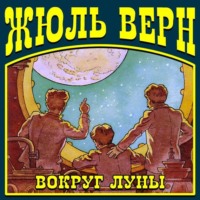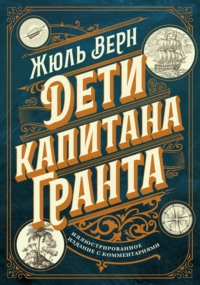 полная версия
полная версияFrom the Earth to the Moon, Direct in Ninety-Seven Hours and Twenty Minutes: and a Trip Round It
It ended with this double hypothesis; either the attraction of the moon would draw it to herself, and the travellers thus attain their end; or that the projectile, held in one immutable orbit, would gravitate around the lunar disc to all eternity.
With such alternatives, what would be the fate of the travellers? Certainly they had food for some time. But supposing they did succeed in their rash enterprise, how would they return? Could they ever return? Should they hear from them? These questions, debated by the most learned pens of the day, strongly engrossed the public attention.
It is advisable here to make a remark which ought to be well considered by hasty observers. When a purely speculative discovery is announced to the public, it cannot be done with too much prudence. No one is obliged to discover either a planet, a comet, or a satellite; and whoever makes a mistake in such a case exposes himself justly to the derision of the mass. Far better is it to wait; and that is what the impatient Joseph T. Maston should have done before sending this telegram forth to the world, which, according to his idea, told the whole result of the enterprise. Indeed this telegram contained two sorts of errors, as was proved eventually. 1st, errors of observation, concerning the distance of the projectile from the surface of the moon, for on the 11th December it was impossible to see it; and what Joseph T. Maston had seen, or thought he saw, could not have been the projectile of the Columbiad. 2ndly, errors of theory on the fate in store for the said projectile; for in making it a satellite of the moon, it was putting it in direct contradiction to all mechanical laws.
One single hypothesis of the observers of Long's Peak could ever be realized, that which foresaw the case of the travellers (if still alive) uniting their efforts with the lunar attraction to attain the surface of the disc.
Now these men, as clever as they were daring, had survived the terrible shock consequent on their departure, and it is their journey in the projectile car which is here related in its most dramatic as well as in its most singular details. This recital will destroy many illusions and surmises; but it will give a true idea of the singular changes in store for such an enterprise; it will bring out the scientific instincts of Barbicane, the industrious resources of Nicholl, and the audacious humour of Michel Ardan.
Besides this, it will prove that their worthy friend, Joseph T. Maston, was wasting his time, while leaning over the gigantic telescope he watched the course of the moon through the starry space.
CHAPTER I.
FROM TWENTY MINUTES PAST TEN TO FORTY-SEVEN MINUTES PAST TEN P.M
As ten o'clock struck, Michel Ardan, Barbicane, and Nicholl, took leave of the numerous friends they were leaving on the earth. The two dogs, destined to propagate the canine race on the lunar continents, were already shut up in the projectile.
The three travellers approached the orifice of the enormous cast-iron tube, and a crane let them down to the conical top of the projectile. There, an opening made for the purpose gave them access to the aluminium car. The tackle belonging to the crane being hauled from outside, the mouth of the Columbiad was instantly disencumbered of its last supports.
Nicholl, once introduced with his companions inside the projectile, began to close the opening by means of a strong plate, held in position by powerful screws. Other plates, closely fitted, covered the lenticular glasses, and the travellers, hermetically enclosed in their metal prison, were plunged in profound darkness.
"And now, my dear companions," said Michel Ardan, "let us make ourselves at home; I am a domesticated man and strong in housekeeping. We are bound to make the best of our new lodgings, and make ourselves comfortable. And first let us try and see a little. Gas was not invented for moles."
So saying, the thoughtless fellow lit a match by striking it on the sole of his boot; and approached the burner fixed to the receptacle, in which the carbonized hydrogen, stored at high pressure, sufficed for the lighting and warming of the projectile for a hundred and forty-four hours, or six days and six nights. The gas caught fire, and thus lighted the projectile looked like a comfortable room with thickly padded walls, furnished with a circular divan, and a roof rounded in the shape of a dome.
The objects it contained, arms, instruments, and utensils securely fastened against the rounds of wadding, could bear the shock of departure with impunity. Humanly speaking, every possible precaution had been taken to bring this rash experiment to a successful termination.
Michel Ardan examined everything, and declared himself satisfied with his installation.
"It is a prison," said he, "but a travelling prison; and, with the right of putting my nose to the window, I could well stand a lease of a hundred years. You smile, Barbicane. Have you any arrière-pensée? Do you say to yourself, 'This prison may be our tomb?' Tomb, perhaps; still I would not change it for Mahomet's, which floats in space but never advances an inch!"
Whilst Michel Ardan was speaking, Barbicane and Nicholl were making their last preparations.
Nicholl's chronometer marked twenty minutes past ten p.m. when the three travellers were finally enclosed in their projectile. This chronometer was set within the tenth of a second by that of Murchison the engineer. Barbicane consulted it.
"My friends," said he, "it is twenty minutes past ten. At forty-seven minutes past ten Murchison will launch the electric spark on the wire which communicates with the charge of the Columbiad. At that precise moment we shall leave our spheroid. Thus we have still twenty-seven minutes to remain on the earth."
"Twenty-six minutes thirteen seconds," replied the methodical Nicholl.
"Well!" exclaimed Michel Ardan, in a good-humoured tone, "much may be done in twenty-six minutes. The gravest questions of morals and politics may be discussed, and even solved."
Twenty-six minutes well employed are worth more than twenty-six years in which nothing is done. Some seconds of a Pascal or a Newton are more precious than the whole existence of a crowd of raw simpletons – "
"And you conclude, then, you everlasting talker?" asked Barbicane.
"I conclude that we have twenty-six minutes left," replied Ardan.
"Twenty-four only," said Nicholl.
"Well, twenty-four, if you like, my noble captain," said Ardan; "twenty-four minutes in which to investigate – "
"Michel," said Barbicane, "during the passage we shall have plenty of time to investigate the most difficult questions. For the present we must occupy ourselves with our departure."
"Are we not ready?"
"Doubtless; but there are still some precautions to be taken, to deaden as much as possible the first shock."
"Have we not the water-cushions placed between the partition-breaks, whose elasticity will sufficiently protect us?"
"I hope so, Michel," replied Barbicane gently, "but I am not sure."
"Ah, the joker!" exclaimed Michel Ardan. "He hopes! – He is not sure! – and he waits for the moment when we are encased to make this deplorable admission! I beg to be allowed to get out!"
"And how?" asked Barbicane.
"Humph!" said Michel Ardan, "it is not easy; we are in the train, and the guard's whistle will sound before twenty-four minutes are over."
"Twenty," said Nicholl.
For some moments the three travellers looked at each other. Then they began to examine the objects imprisoned with them.
"Everything is in its place," said Barbicane. "We have now to decide how we can best place ourselves to resist the shock. Position cannot be an indifferent matter; and we must, as much as possible, prevent the rush of blood to the head."
"Just so," said Nicholl.
"Then," replied Michel Ardan, ready to suit the action to the word, "let us put our heads down and our feet in the air, like the clowns in the grand circus."
"No," said Barbicane, "let us stretch ourselves on our sides; we shall resist the shock better that way. Remember that, when the projectile starts, it matters little whether we are in it or before it; it amounts to much the same thing."
"If it is only 'much the same thing,' I may cheer up," said Michel Ardan.
"Do you approve of my idea, Nicholl?" asked Barbicane.
"Entirely," replied the captain. "We've still thirteen minutes and a half."
"That Nicholl is not a man," exclaimed Michel; "he is a chronometer with seconds, an escape, and eight holes."
But his companions were not listening; they were taking up their last positions with the most perfect coolness. They were like two methodical travellers in a car, seeking to place themselves as comfortably as possible.
We might well ask ourselves of what materials are the hearts of these Americans made, to whom the approach of the most frightful danger added no pulsation.
Three thick and solidly-made couches had been placed in the projectile. Nicholl and Barbicane placed them in the centre of the disc forming the floor. There the three travellers were to stretch themselves some moments before their departure.
During this time, Ardan, not being able to keep still, turned in his narrow prison like a wild beast in a cage, chatting with his friends, speaking to the dogs Diana and Satellite, to whom, as may be seen, he had given significant names.
"Ah, Diana! Ah, Satellite!" he exclaimed, teazing them; "so you are going to show the moon-dogs the good habits of the dogs of the earth! That will do honour to the canine race! If ever we do come down again, I will bring a cross type of 'moon-dogs,' which will make a stir!"
"If there are dogs in the moon," said Barbicane.
"There are," said Michel Ardan, "just as there are horses, cows, donkeys, and chickens. I bet that we shall find chickens."
"A hundred dollars we shall find none!" said Nicholl.
"Done, my captain!" replied Ardan, clasping Nicholl's hand. "But, by the bye, you have already lost three bets with our president, as the necessary funds for the enterprise have been found, as the operation of casting has been successful, and lastly, as the Columbiad has been loaded without accident, six thousand dollars."
"Yes," replied Nicholl. "Thirty-seven minutes six seconds past ten."
"It is understood, captain. Well, before another quarter of an hour you will have to count 9000 dollars to the president; 4000 because the Columbiad will not burst, and 5000 because the projectile will rise more than six miles in the air."
"I have the dollars," replied Nicholl, slapping the pocket of his coat. "I only ask to be allowed to pay."
"Come, Nicholl, I see that you are a man of method, which I could never be; but indeed you have made a series of bets of very little advantage to yourself, allow me to tell you."
"And why?" asked Nicholl.
"Because, if you gain the first, the Columbiad will have burst, and the projectile with it; and Barbicane will no longer be there to reimburse your dollars."
"My stake is deposited at the bank in Baltimore," replied Barbicane simply; "and if Nicholl is not there, it will go to his heirs."
"Ah, you practical men!" exclaimed Michel Ardan; "I admire you the more for not being able to understand you."
"Forty-two minutes past ten!" said Nicholl.
"Only five minutes more!" answered Barbicane.
"Yes, five little minutes!" replied Michel Ardan; "and we are enclosed in a projectile, at the bottom of a gun 900 feet long! And under this projectile are rammed 400,000 lbs. of gun-cotton, which is equal to 1,600,000 lbs. of ordinary powder! And friend Murchison, with his chronometer in hand, his eye fixed on the needle, his finger on the electric apparatus, is counting the seconds preparatory to launching us into interplanetary space."
"Enough, Michel, enough!" said Barbicane, in a serious voice; "let us prepare. A few instants alone separate us from an eventful moment. One clasp of the hand, my friends."
"Yes," exclaimed Michel Ardan, more moved than he wished to appear; and the three bold companions were united in a last embrace.
"God preserve us!" said the religious Barbicane.
Michel Ardan and Nicholl stretched themselves on the couches placed in the centre of the disc.
"Forty seven minutes past ten!" murmured the captain.
"Twenty seconds more!" Barbicane quickly put out the gas and lay down by his companions, and the profound silence was only broken by the ticking of the chronometer marking the seconds.
Suddenly a dreadful shock was felt, and the projectile, under the force of six billions of litres of gas, developed by the combustion of the pyroxyle, mounted into space.
CHAPTER II.
THE FIRST HALF-HOUR
What had happened? What effect had this frightful shock produced? Had the ingenuity of the constructors of the projectile obtained any happy result? Had the shock been deadened, thanks to the springs, the four plugs, the water-cushions, and the partition-breaks? Had they been able to subdue the frightful pressure of the initiatory speed of more than 11,000 yards, which was enough to traverse Paris or New York in a second? This was evidently the question suggested to the thousand spectators of this moving scene. They forgot the aim of the journey, and thought only of the travellers. And if one amongst them – Joseph T. Maston for example – could have cast one glimpse into the projectile, what would he have seen?
Nothing then. The darkness was profound. But its cylindro-conical partitions had resisted wonderfully. Not a rent or a dent anywhere! The wonderful projectile was not even heated under the intense deflagration of the powder, nor liquefied, as they seemed to fear, in a shower of aluminium.
The interior showed but little disorder; indeed, only a few objects had been violently thrown towards the roof; but the most important seemed not to have suffered from the shock at all; their fixtures were intact.
On the movable disc, sunk down to the bottom by the smashing of the partition-breaks and the escape of the water, three bodies lay apparently lifeless. Barbicane, Nicholl, and Michel Ardan – did they still breathe? or was the projectile nothing now but a metal coffin, bearing three corpses into space?
Some minutes after the departure of the projectile, one of the bodies moved, shook its arms, lifted its head, and finally succeeded in getting on its knees. It was Michel Ardan. He felt himself all over, gave a sonorous "Hem!" and then said, —
"Michel Ardan is whole. How about the others?"
The courageous Frenchman tried to rise, but could not stand. His head swam, from the rush of blood; he was blind; he was like a drunken man.
"Bur-r!" said he. "It produces the same effect as two bottles of Corton, though perhaps less agreeable to swallow." Then, passing his hand several times across his forehead and rubbing his temples, he called in a firm voice, —
"Nicholl! Barbicane!"
He waited anxiously. No answer; not even a sigh to show that the hearts of his companions were still beating. He called again. The same silence.
"The devil!" he exclaimed. They look as if they had fallen from a fifth story on their heads. "Bah!" he added, with that imperturbable confidence which nothing could check, "if a Frenchman can get on his knees, two Americans ought to be able to get on their feet. But first let us light up."
Ardan felt the tide of life return by degrees. His blood became calm, and returned to its accustomed circulation. Another effort restored his equilibrium. He succeeded in rising, drew a match from his pocket, and approaching the burner lighted it. The receiver had not suffered at all. The gas had not escaped. Besides, the smell would have betrayed it; and in that case Michel Ardan could not have carried a lighted match with impunity through the space filled with hydrogen. The gas mixing with the air would have produced a detonating mixture, and the explosion would have finished what the shock had perhaps begun. When the burner was lit, Ardan leaned over the bodies of his companions: they were lying one on the other, an inert mass, Nicholl above, Barbicane underneath.
Ardan lifted the captain, propped him up against the divan, and began to rub vigorously. This means, used with judgment, restored Nicholl, who opened his eyes, and instantly recovering his presence of mind, seized Ardan's hand and looked around him.
"And Barbicane?" said he.
"Each in turn," replied Michel Ardan. "I began with you, Nicholl, because you were on the top. Now let us look to Barbicane." Saying which, Ardan and Nicholl raised the president of the Gun Club and laid him on the divan. He seemed to have suffered more than either of his companions; he was bleeding, but Nicholl was reassured by finding that the hemorrhage came from a slight wound on the shoulder, a mere graze, which he bound up carefully.
Still, Barbicane was a long time coming to himself, which frightened his friends, who did not spare friction.
"He breathes though," said Nicholl, putting his ear to the chest of the wounded man.
"Yes," replied Ardan, "he breathes like a man who has some notion of that daily operation. Rub, Nicholl; let us rub harder." And the two improvised practitioners worked so hard and so well that Barbicane recovered his senses. He opened his eyes, sat up, took his two friends by the hands, and his first words were —
"Nicholl, are we moving?"
Nicholl and Barbicane looked at each other; they had not yet troubled themselves about the projectile; their first thought had been for the traveller, not for the car.
"Well, are we really moving?" repeated Michel Ardan.
"Or quietly resting on the soil of Florida?" asked Nicholl.
"Or at the bottom of the Gulf of Mexico?" added Michel Ardan.
"What an idea!" exclaimed the president.
And this double hypothesis suggested by his companions had the effect of recalling him to his senses. In any case they could not yet decide on the position of the projectile. Its apparent immovability, and the want of communication with the outside, prevented them from solving the question. Perhaps the projectile was unwinding its course through space. Perhaps after a short rise it had fallen upon the earth, or even in the Gulf of Mexico – a fall which the narrowness of the peninsula of Florida would render not impossible.
The case was serious, the problem interesting, and one that must be solved as soon as possible. Thus, highly excited, Barbicane's moral energy triumphed over physical weakness, and he rose to his feet. He listened. Outside was perfect silence; but the thick padding was enough to intercept all sounds coming from the earth. But one circumstance struck Barbicane, viz., that the temperature inside the projectile was singularly high. The president drew a thermometer from its case and consulted it. The instrument showed 81° Fahr.
"Yes," he exclaimed, "yes, we are moving! This stifling heat, penetrating through the partitions of the projectile, is produced by its friction on the atmospheric strata. It will soon diminish, because we are already floating in space, and after having been nearly stifled, we shall have to suffer intense cold."
"What!" said Michel Ardan. "According to your showing, Barbicane, we are already beyond the limits of the terrestrial atmosphere?"
"Without a doubt, Michel. Listen to me. It is fifty-five minutes past ten; we have been gone about eight minutes; and if our initiatory speed has not been checked by the friction, six seconds would be enough for us to pass through the forty miles of atmosphere which surrounds the globe."
"Just so," replied Nicholl; "but in what proportion do you estimate the diminution of speed by friction?"
"In the proportion of one-third, Nicholl. This diminution is considerable, but according to my calculations it is nothing less. If, then, we had an initiatory speed of 12,000 yards, on leaving the atmosphere this speed would be reduced to 9165 yards. In any case we have already passed through this interval, and – "
"And then," said Michel Ardan, "friend Nicholl has lost his two bets: four thousand dollars because the Columbiad did not burst; five thousand dollars because the projectile has risen more than six miles. Now, Nicholl, pay up."
"Let us prove it first," said the captain, "and we will pay afterwards. It is quite possible that Barbicane's reasoning is correct, and that I have lost my nine thousand dollars. But a new hypothesis presents itself to my mind, and it annuls the wager."
"What is that?" asked Barbicane quickly.
"The hypothesis that, for some reason or other, fire was never set to the powder, we have not started at all."
"My goodness, captain," exclaimed Michel Ardan, "that hypothesis is worthy of my brain! It cannot be a serious one. For have we not been half annihilated by the shock? Did I not recall you to life? Is not the president's shoulder still bleeding from the blow it has received?"
"Granted," replied Nicholl; "but one question."
"Well, captain?"
"Did you hear the detonation, which certainly ought to be loud?"
"No," replied Ardan, much surprised; "certainly I did not hear the detonation."
"And you, Barbicane?"
"Nor I, either."
"Very well," said Nicholl.
"Well now," murmured the president "why did we not hear the detonation?"
The three friends looked at each other with a disconcerted air. It was quite an inexplicable phenomenon. The projectile had started, and consequently there must have been a detonation.
"Let us first find out where we are," said Barbicane, "and let down the panel."
This very simple operation was soon accomplished.
The nuts which held the bolts to the outer plates of the right-hand scuttle gave way under the pressure of the English wrench. These bolts were pushed outside, and buffers covered with india-rubber stopped up the holes which let them through. Immediately the outer plate fell back upon its hinges like a porthole, and the lenticular glass which closed the scuttle appeared. A similar one was let into the thick partition on the opposite side of the projectile, another in the top of the dome, and finally a fourth in the middle of the base. They could, therefore, make observations in four different directions: the firmament by the side and most direct windows, the earth or the moon by the upper and under openings in the projectile.
Barbicane and his two companions immediately rushed to the uncovered window. But it was lit by no ray of light. Profound darkness surrounded them, which, however, did not prevent the president from exclaiming, —
"No, my friends, we have not fallen back upon the earth; no, nor are we submerged in the Gulf of Mexico. Yes! we are mounting into space. See those stars shining in the night, and that impenetrable darkness heaped up between the earth and us!"
"Hurrah! hurrah!" exclaimed Michel Ardan and Nicholl in one voice.
Indeed, this thick darkness proved that the projectile had left the earth, for the soil, brilliantly lit by the moonbeams, would have been visible to the travellers, if they had been lying on its surface. This darkness also showed that the projectile had passed the atmospheric strata, for the diffused light spread in the air would have been reflected on the metal walls, which reflection was wanting. This light would have lit the window, and the window was dark. Doubt was no longer possible; the travellers had left the earth.
"I have lost," said Nicholl.
"I congratulate you," replied Ardan.
"Here are the nine thousand dollars," said the captain, drawing a roll of paper dollars from his pocket.
"Will you have a receipt for it?" asked Barbicane, taking the sum.
"If you do not mind," answered Nicholl; "it is more business-like."
And coolly and seriously, as if he had been at his strong-box, the president drew forth his note-book, tore out a blank leaf, wrote a proper receipt in pencil, dated and signed it with the usual flourish,* and gave it to the captain, who carefully placed it in his pocketbook. Michel Ardan, taking off his hat, bowed to his two companions without speaking. So much formality under such circumstances left him speechless. He had never before seen anything so "American."
* This is a purely French habit.
This affair settled, Barbicane and Nicholl had returned to the window, and were watching the constellations. The stars looked like bright points on the black sky. But from that side they could not see the orb of night, which, travelling from east to west, would rise by degrees towards the zenith. Its absence drew the following remark from Ardan.








